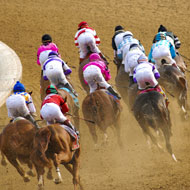Wearable tech for racehorses could reduce fatalities

The device records information about the animal's movement, such as speed and acceleration.
A wearable device that monitors a horse’s physical well-being during a race could help to prevent fatal injuries.
According to New Scientist, the Equimètre sensor, developed by Arioneo in Paris, France, is designed to reduce fatalities, prevent injury and help trainers sharpen a horse’s performance.
The sensor fits into the girth - a strap around the horse’s middle that keeps the saddle on. This records physiological data like temperature, heart and respiratory rate which can be viewed in real time via an app.
The device also records information about the animal's movement, such as speed and acceleration, and monitors environmental conditions, like humidity.
The manufacturers say that the Equimètre differs to other smart devices that capture similar data, because it runs the stats through algorithms. These are then compared with past performances.
“A trainer’s eye is very important and we do not want to replace their expertise,” says Arioneo co-founder Valentin Rapin. “This tool will give trainers information they don’t have today.”
For example, instead of the showing an increase in heart rate, the Equimètre device can put this into context and tell the trainer what it means for that particular horse in those particular conditions. “It can prevent overtraining,” adds Rapin.
It is hoped the device will catch injuries like bucked shins. Affecting around 70 per cent of young thoroughbreds, bucked shins can lead to stress fractures, which often result in a horse being killed.
Welcoming the device, horse vet Hervé Moreau from La Ferté-Saint-Cyr, France, said: "The early detection of locomotion problems can only improve diagnosis. Similarly, optimising the training programme will reduce the risk of stress factors.”



 RCVS Knowledge has welcomed Professor Peter Cockcroft as editor-in-chief for Veterinary Evidence.
RCVS Knowledge has welcomed Professor Peter Cockcroft as editor-in-chief for Veterinary Evidence.